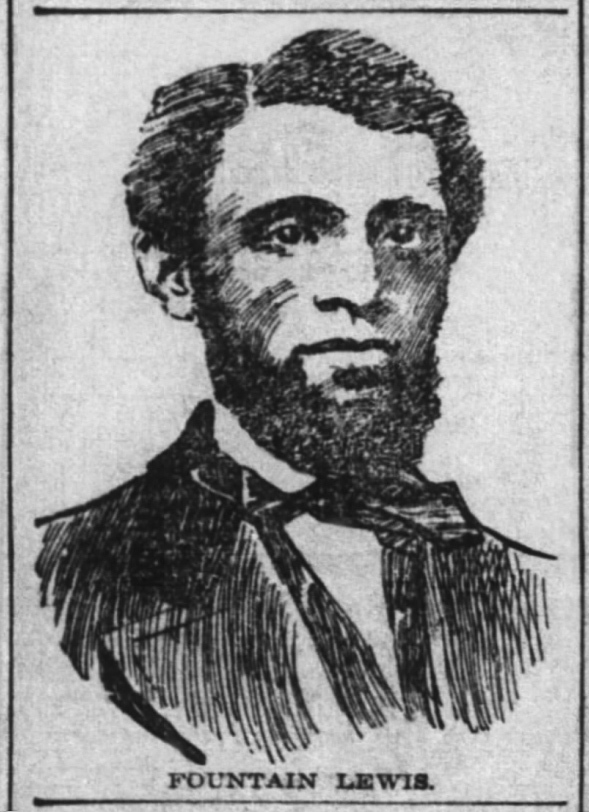Fountain Lewis
Fountain Lewis (b. Frankfort, KY, August 1820-d. January 4, 1898, Cincinnati, OH, buried Union Baptist Cemetery) Barber, Entrepreneur, Community Leader
Fountain Lewis, a venerable barber, was one of Cincinnati’s most esteemed 19th c. African American entrepreneurs. He managed and owned barbershops downtown for over 50 years, from the early 1840s until the late 1890s. An active community leader, Lewis donated to local charities.
Fountain Lewis was born on a plantation in Frankfort, Kentucky, in August of 1820. His mother, freed from slavery just before his birth, worked for “dimes a day” to buy his freedom from enslavement, as well as her other children’s. He learned the trade of the tonsorial arts at a young age in Lexington, Kentucky, and came to Cincinnati in April 1841. His identity as a barber and moral character is first apparent in 1843 when he signed a petition to City Council, along with 54 local barbers, lobbying to close shops on Sunday, stating the Sabbath should be a day of rest. He worked with his mother to bring his father to live in Cincinnati as well. Lewis was “active in public matters pertaining to his race” and donated to charities for the benefit of African Americans. He was a trustee of Union Baptist Church and a devout member for 55 years, as well as a trustee of the Crawford Home for Aged Colored Men in College Hill.
Lewis first appears in the 1851 Williams’ Cincinnati Directory, working as a barber with John P. Ferrie at a barbershop at 4 W. Fourth Street, north side between Main and Walnut streets. Fountain Lewis with his wife Daphney R. (Cotton) Lewis, dressmaker, is listed at a residence, 266 Longworth Street, in the 1857 Williams’ Directory; the last year Ferrie is listed. According to Dabney’s biographical sketch of Lewis, “Ferree (sic) … disposing of his shop to Lewis went to New York.” Then George Tosspot is listed as a new partner with Lewis in the same barbershop until 1868 and, then Lewis becomes the sole proprietor of his barbershop on Fourth Street.
Lewis became an established leader in the ranks of Cincinnati’s early African American businessmen, cutting hair and shaving the city’s wealthiest white men in the “high rent” district downtown. In an interview in The Cincinnati Enquirer just months before his death, Lewis said, “Grand and magnificent men were customers of mine at that same old shop.” Lewis lists customers Reuben R. Springer, founding benefactor of Cincinnati Music Hall; Charles Telford; Rufus King; Josiah Lawrence; (John) Scott Harrison, son of President William Henry Harrison; Kentucky Governor Charles S. Morehead; Nicholas Longworth; General William Haines Lytle; U.S. Senator Henry Clay; Tom Corwin; John J. Crittenden; James J. Faran; and Dick (Richard Mentor) Johnson.
Lewis lived at three addresses between 1866 and 1892: from central downtown, 15 Home Street, to the west side, 207 Smith Street in 1870, before settling in 1874 just three blocks west behind Saengerhalle then Cincinnati Music Hall in 1878, for 18 years, at 92 Betts Street with Daphney and their son, Fountain C. Lewis Jr. (Lewis Jr. in 1880, is first listed as a barber and manager at 182 Vine St.) In an interview eight months before his death, Lewis said his barbershop was on the northwest corner of Fourth and Main for 44 years and that he was forced to move by city development in 1884 to 34 W. Fourth Street.
With his wife Daphney, Lewis had 11 children, but only two were living at the time of his death: Fountain C. Lewis, Jr., and Newman Lewis. Both followed in the footsteps of their father as barbers in Cincinnati. Daphney died at their Betts Street home in 1891. The following year Lewis married, Lucetta Tanner West, the widow of William West, a prominent coal dealer and a partner in West & Clark Company. She was the granddaughter of Charles McMicken, founder of the University of Cincinnati.
The 1893 Williams’ Directory indicates Lewis moved to 99 May Street until 1896, then to 2409 May Street in Walnut Hills. By 1895, Lewis was listed as a barber at 510 Race Street. His obituary in the Cincinnati Commercial Tribune stated Lewis, “at one time possessed considerable property … and the shop he operated on Race near Fifth was sold a few days before his death.” The Tribune then reported his estate was worth $10,000 and his sons received half interests in his business. The venerable barber, Fountain Lewis cut and shaved hair in Cincinnati for at least 54 years before passing away peacefully in his home on May Street in Walnut Hills. He walked back and forth every day from his residence to work, even at the age of 77, the year he died.
On January 4, 1898, the funeral of Fountain Lewis drew a large crowd that overflowed onto Mound and Richmond streets at Union Baptist Church. The Enquirer reported “distinguished white people” and hundreds of the “higher circles of the deceased’s race” were in attendance. The official Board of Deacons of the church, some half-a-century associates of Lewis, and prominent gray-haired white citizens sat in front, which was described as a “striking picture of homage paid by two races.” Reverend Dr. Prowd spoke about Fountain Lewis’s character as “faithful to himself, his family, his friends, his race, his country and true to the American flag; he had principle and stood up for it under all circumstances, being a man strong in his convictions and fearless in action. He placed before the community a life of flawless honor and integrity.”
Images
